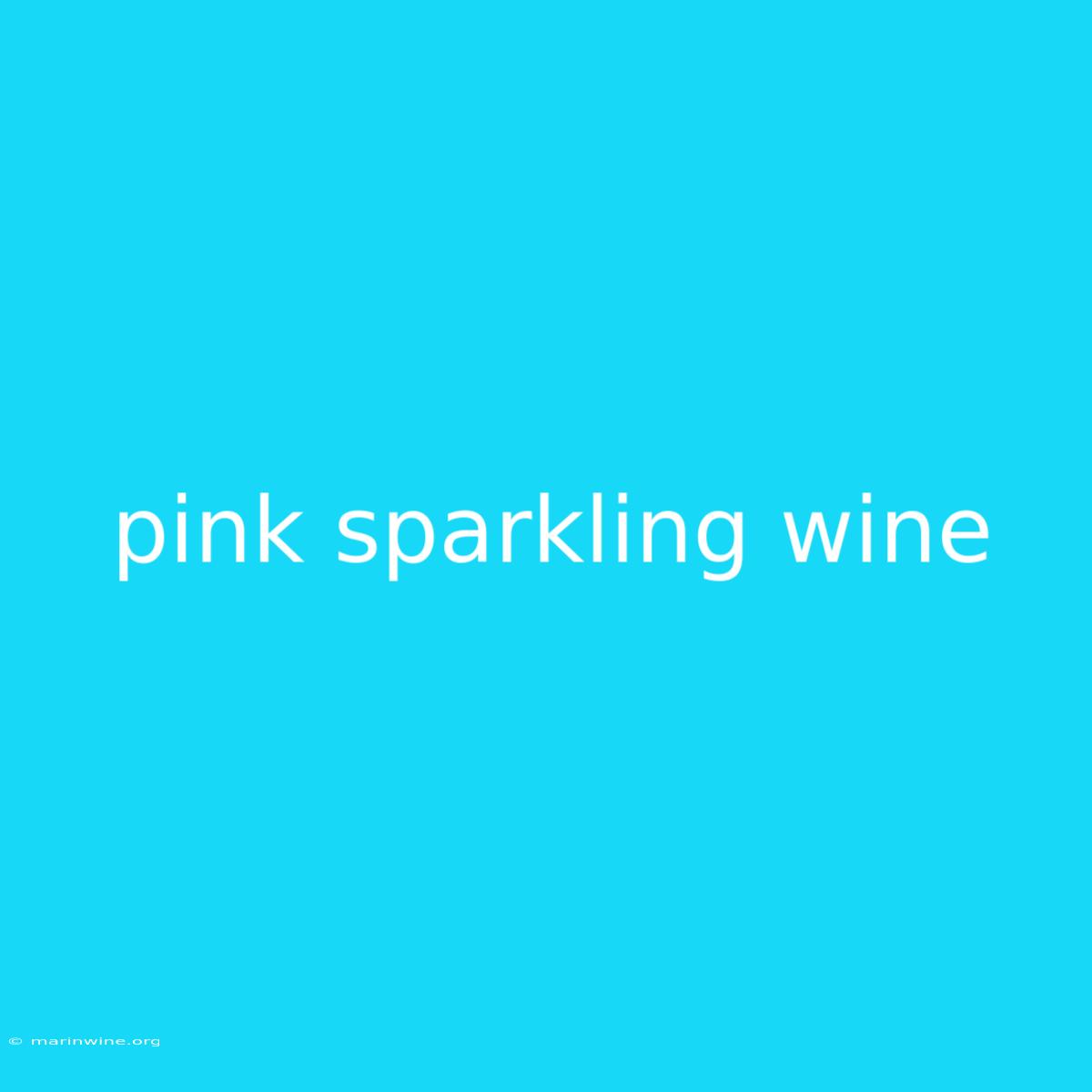Uncorking the Magic: Exploring the World of Pink Sparkling Wine
Have you ever wondered why pink sparkling wine is so captivating? It's more than just a pretty color—it's a symphony of flavors, textures, and aromas that dance on your palate. Let's delve into the fascinating world of this beloved bubbly.
Why It Matters: Pink sparkling wine, also known as rosé sparkling wine, is experiencing a surge in popularity. It's no longer just a summertime drink; it's becoming a go-to choice for celebrations, special occasions, and everyday enjoyment. Understanding the nuances of this style of wine can enhance your appreciation and guide you to discovering your perfect pink bubbly.
Key Takeaways of Pink Sparkling Wine
| Feature | Description |
|---|---|
| Color | Ranges from pale salmon to vibrant pink, reflecting the amount of skin contact during winemaking. |
| Flavor Profile | Often displays notes of red fruit, floral aromas, and a refreshing acidity. |
| Production Methods | Primarily made using the "saignée" (bleeding) method, where red grape juice is removed from the red winemaking process to create the rosé. |
| Regions | Popular worldwide, with notable producers in France, Spain, Italy, and the United States. |
| Styles | Can be found in both dry and sweet styles, with varying levels of complexity and aging. |
Pink Sparkling Wine: A Closer Look
The Allure of Color
The captivating color of pink sparkling wine is a direct result of the winemaking process. Unlike white wines, which are made without skin contact, pink sparkling wine undergoes a period of skin contact with red grape juice, allowing the pigments to be extracted. This process results in the delightful range of pink hues we see in these wines.
Flavors and Aromas
Pink sparkling wine boasts a diverse flavor profile, often characterized by red fruit notes like strawberries, raspberries, and cherries. Floral aromas such as rose, violet, and honeysuckle can also be prominent. The acidity level is typically balanced and refreshing, adding to the wine's overall pleasantness.
Production Methods
The most common method for producing pink sparkling wine is the "saignée" method, which involves a technique of "bleeding" red grape juice from the red winemaking process. This juice is then fermented separately to create the rosé. The resulting wine is lighter in color and body than its red counterpart.
Regions of Excellence
Pink sparkling wines are produced in various regions worldwide, each offering a unique character and flavor profile. Some notable regions include:
- Champagne, France: Known for its elegance and complexity.
- Provence, France: Renowned for its pale salmon color and delicate flavors.
- Cava, Spain: Offers a wide range of styles, from dry to sweet.
- Prosecco, Italy: Known for its vibrant pink hues and fruity notes.
- California, USA: Produces pink sparkling wines with diverse styles and appellations.
Styles and Complexity
Pink sparkling wines can be found in a variety of styles, from dry and crisp to sweet and decadent. Dry styles, often labeled as "Brut" or "Extra Brut," are characterized by a dry finish and higher acidity, while sweeter styles, such as "Demi-Sec" or "Doux," offer a lingering sweetness. Aging also plays a significant role in complexity, with some pink sparkling wines developing additional layers of flavor and aroma over time.
FAQ for Pink Sparkling Wine
Q: Is pink sparkling wine better than white sparkling wine?
A: It's a matter of personal preference! Pink sparkling wine offers a unique flavor profile with red fruit and floral notes, while white sparkling wine showcases citrus and apple flavors. Both are delicious and offer diverse tasting experiences.
Q: How should I serve pink sparkling wine?
A: Serve it chilled, around 45-50°F, to enhance its aromas and refreshing qualities.
Q: What foods pair well with pink sparkling wine?
A: Its versatility makes it a perfect pairing for a variety of cuisines. Enjoy it with appetizers, seafood, poultry, and salads. Its vibrant acidity complements spicy dishes as well.
Q: Is pink sparkling wine only for special occasions?
A: Absolutely not! While it makes a delightful addition to any celebration, pink sparkling wine can be enjoyed anytime and with any occasion.
Tips for Enjoying Pink Sparkling Wine
- Choose a high-quality bottle: Opt for a well-respected producer or a bottle with a good reputation.
- Open the bottle with care: Use a dedicated wine opener or a Champagne sabering technique for a dramatic presentation.
- Pour with finesse: Fill the glass about halfway to allow the bubbles to develop.
- Drink it fresh: For optimal enjoyment, drink the pink sparkling wine within a few hours of opening.
- Experiment with different styles: Explore different regions, styles, and producers to find your personal favorites.
Summary of Pink Sparkling Wine
Pink sparkling wine is a captivating beverage that combines elegance with a delightful range of flavors and aromas. From its alluring pink hue to its versatile flavor profile, it's a wine that's sure to elevate any occasion. Explore the world of pink sparkling wine, discover your favorites, and enjoy the magic of this bubbly delight.
Closing Message: The journey into the world of pink sparkling wine is an adventure of discovery. As you explore its fascinating nuances, remember that every bottle offers a unique expression of this delightful beverage. So, uncork a bottle, savor the flavors, and celebrate the enchantment of pink sparkling wine.

